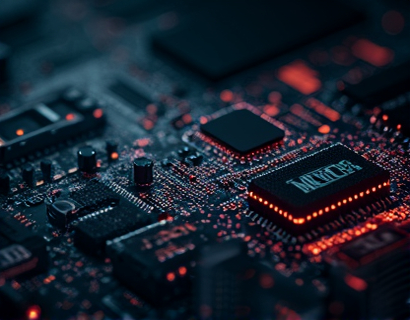Smart Contract Driven Payout Automation: Revolutionizing Business Financial Management
In the rapidly evolving landscape of FinTech, smart contract technology stands out as a transformative force, particularly in the realm of financial management. This innovative approach leverages the power of blockchain to automate and secure the distribution of dividends, earnings, and scheduled payments. By doing so, it ensures transactions are not only secure and transparent but also highly efficient, reducing the need for intermediaries and minimizing the risk of errors or fraud.
The traditional methods of managing financial obligations are often cumbersome and prone to delays. Manual processes require significant time and resources, increasing the likelihood of human error and potential disputes. Smart contracts, on the other hand, are self-executing contracts with the terms of the agreement directly written into code. Once the predefined conditions are met, the contract automatically executes the agreed-upon actions, such as transferring funds.
One of the key benefits of smart contract driven payout automation is the enhancement of financial control for businesses. By automating routine financial tasks, companies can allocate resources more effectively, reducing operational costs and improving overall efficiency. This is particularly valuable for businesses that handle frequent and repetitive payments, such as dividend distributions to shareholders or regular salary payments to employees.
Smart contracts provide a level of transparency that is unparalleled in traditional financial systems. Every transaction is recorded on a blockchain, a decentralized ledger that is immutable and accessible to all parties involved. This transparency builds trust among stakeholders, as they can verify the execution of transactions in real-time. For businesses, this means reduced administrative burdens and a more straightforward audit process.
The automation of payouts through smart contracts also enhances the reliability of financial processes. Once a smart contract is deployed, it operates based on the predefined rules and conditions, eliminating the need for manual intervention. This reduces the risk of delays or failures due to human error or intentional tampering. For instance, in the case of dividend payments, smart contracts can ensure that funds are distributed to shareholders as soon as the company's board approves the payment and the necessary conditions are met.
Another significant advantage of smart contract driven payout automation is the reduction of counterparty risk. In traditional financial transactions, each party relies on the other to fulfill their obligations, which can lead to disputes and legal issues. Smart contracts mitigate this risk by enforcing the terms of the agreement automatically. If a condition is not met, the contract remains inactive until the condition is satisfied, ensuring that payments are only released when appropriate.
For businesses looking to implement smart contract driven payout automation, there are several platforms and tools available that leverage this technology. These platforms provide user-friendly interfaces and robust backend infrastructure to facilitate the creation, deployment, and management of smart contracts. By using these platforms, businesses can integrate payout automation into their existing financial systems with minimal disruption.
One such platform offers a comprehensive solution for automating the payout process. It allows businesses to define the terms of their payouts in a smart contract, specifying conditions such as payment amounts, frequencies, and triggers. Once the contract is deployed, it monitors the specified conditions and executes the payment automatically when the criteria are met. This streamlines the entire payout process, from initiation to completion, ensuring that payments are made promptly and accurately.
The implementation of smart contract driven payout automation can lead to significant cost savings for businesses. By reducing the need for intermediaries such as banks and payment processors, companies can lower transaction fees. Additionally, the automation of routine tasks frees up staff to focus on more strategic initiatives, further enhancing operational efficiency. For example, a corporation that previously spent a substantial portion of its budget on payroll processing and distribution can redirect these funds towards innovation and growth.
Moreover, smart contract driven payout automation enhances compliance and regulatory adherence. Many industries are subject to strict financial regulations, and ensuring compliance can be a complex and time-consuming process. Smart contracts can be programmed to adhere to specific regulatory requirements, automatically enforcing compliance rules and generating necessary reports. This not only simplifies the compliance process but also reduces the risk of penalties and legal issues.
The use of smart contracts in payout automation also fosters greater collaboration and trust among business partners. In scenarios where multiple parties are involved in a transaction, such as joint ventures or partnerships, smart contracts ensure that all conditions are met and payments are distributed fairly. This transparency and automation build a foundation of trust, encouraging more businesses to engage in collaborative financial arrangements.
To fully leverage the benefits of smart contract driven payout automation, businesses should consider the following best practices. First, it is crucial to clearly define the terms of the smart contract, ensuring that all conditions and parameters are accurately specified. This includes setting up triggers, payment amounts, and any contingencies. Second, thorough testing of the smart contract is essential before deployment to identify and rectify any potential issues. This can be done through simulation environments provided by the platform.
Third, businesses should ensure that their IT infrastructure is compatible with smart contract technology. This may involve upgrading systems or integrating new tools to support the deployment and management of smart contracts. Finally, ongoing monitoring and maintenance of the smart contracts are necessary to ensure they continue to function as intended and adapt to any changes in business requirements.
In conclusion, smart contract driven payout automation represents a significant advancement in business financial management. By automating the distribution of dividends, earnings, and scheduled payments, businesses can achieve greater efficiency, transparency, and security. This technology not only streamlines financial processes but also enhances trust and compliance, making it an invaluable tool for companies aiming to optimize their financial operations. As the adoption of blockchain and smart contract technology continues to grow, businesses that embrace these innovations will be well-positioned to thrive in the modern financial landscape.











































